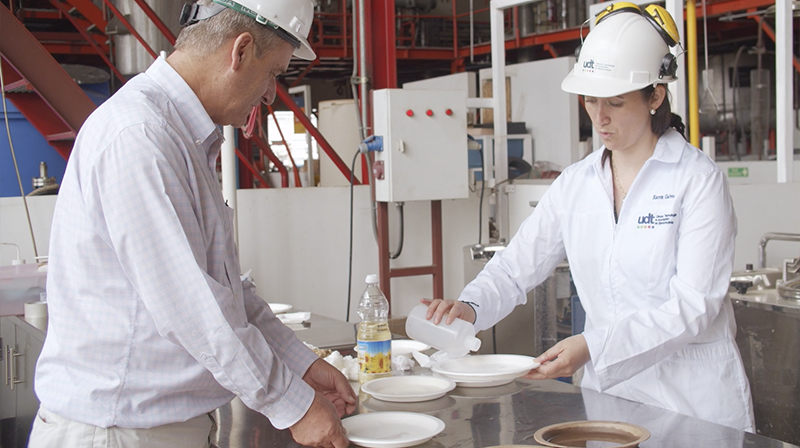A milestone for the region and a boost for the development of recycling was the successful outcome of the project that seeks to replace single-use plastic items with molded cellulose.
The initiative, financed by the Biobío Regional Government through the Regional Competitiveness Innovation Fund and executed by the Technological Development Unit (UDT) of the Universidad de Concepción (UdeC) during the one-year execution period, it was possible to verify the different attributes of cellulose fibers for the intended application.
Iván Valenzuela, Head of the Development and Industry Division of Gore Biobío, expressed his satisfaction with the progress of the project and commented that this type of initiative allows the region to be at the forefront. He said that “these are relevant projects for the country and mainly for the region. The challenge is to look for markets where to commercialize these new products and make them available to the sectors that require solutions like these”.
This type of technological innovation helps to combat climate change, given that disposable plastics are a serious environmental problem. Cups, plates, bags or bottles end up as garbage and accumulate in the environment in which we live, because they do not degrade under natural conditions. Currently, plastic consumption in Chile is 960 thousand tons per year and of this volume, only 11% is recycled.
Alex Berg, director of UDT, commented that during these months they reached important conclusions regarding the use of this material. “Thanks to the support of the Biobío Regional Government, we have been able to scale up the technology to a pilot level, developing various prototypes and evaluating their technical and economic viability. This is a competitive alternative born in Biobío; the material has good mechanical properties and is easy to produce; we were able to reduce water and fat absorption to a minimum, and we avoided the passage of oxygen”.
Débora Pino, project engineer, said that “the implementation of the technology will have a strong impact, as it will expand the value chain and differentiate forestry production, enable companies in the region to have a packaging with a very low environmental footprint and open up the possibility of starting a new productive activity”.
Sofía Valenzuela, the Seremi of Science of the South Central Macro-zone, highlighted the innovation work that is being born in Biobío. “This project, which promotes the development of the bioeconomy, allows us to reuse packaging material, give greater value to forestry production and will, we hope, allow a series of science and technology-based companies to add value and generate new stable and well-paid jobs.”
Competitive advantages
Molded cellulose is a material composed of cellulose fibers and bio-based additives that can be molded, take on different shapes and give life to differentiated products. The material is biodegradable, its raw materials are renewable and it can be used in a wide variety of applications, such as packaging and stationery products.
Among the competitive advantages of cellulose, Alex Berg points out that it can be used to generate molded products with good technical characteristics and could be integrated into the paper and cardboard recovery cycles, whose recycling rates in Chile reach 80%.
The purpose of UDT is to continue to be a national reference center in applied R&D and to lead the development of technological solutions that promote a circular economy. Three fundamental challenges are: The biodesign of new products, the recycling of household and industrial waste, and the generation of solutions to address the Extended Producer Responsibility Law, the REP Law.

